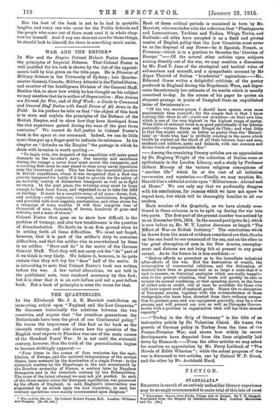WAR AND THE EMPIRE.*
IN War and the Empire Colonel Hubert Foster discusses the principles of Imperial Defence. That Colonel Foster is well qualified for his task is shown by the list of the appoint- ments held by him given on the title-page. He is Director of Military Science in the University of Sydney ; late Quarter- master-General, Canada; Military Attache in the United States; and member of the Intelligence Division of the General Staff. Besides this, to show how widely be has thought on his subject we may mention that he is author of Organization : How Armies are Formed for War, and of Staff Work a Guide to Command and General Staff Duties with Small Forces of All Arms in the Field. In his preface he tells us that "the object of this book is to state and explain the principles of the Defence of the British Empire, and to show how they have developed from the rich experience gained during the wars of the past three centuries." We cannot do full justice to Colonel Foster's book in the space at our command. Indeed, we can do little more than put up a finger-post to indicate its existence. In his chapter on "Attacks on the Empire" the passage in which he deals with invasion is worth quoting :— " To begin with, the despatch of the expedition will make great demands on the invader's navy. For security and assistance during the voyage a naval force must escort the transports, and a covering fleet must be sent ahead to clear away naval opposition near the threatened coast. This has been the invariable practice in British expeditions, where it was recognised that a fleet was gravely hampered for battle if it had to provide for the safety of an unwieldy convoy of defenceless transports as well as to fight an enemy. In the next place, the invading army must be large enough to beat local forces, and organised to as to take the field on landing. It must be a complete army of all arms—horse, foot, and artillery—with engineers, transport, ambulances, hospitals, and provided with food supplies, ammunition, and other stores for a campaign of some months. It will thus comprise tens of thousands of men, thousands of horses, hundreds of guns and vehicles, and a mass of stores."
Colonel Foster then goes on to show how difficult is the problem of tonnage, and also how troublesome is the question of disembarkation. No doubt he is on firm ground when he is setting forth all these difficulties. We must not forget, however, that it is part of the soldier's duty to overcome difficulties, and that the soldier who is overwhelmed by them is no soldier. "Dare and do" is the motto of the German General Staff. That they will not carry out the " do " part of it we think is very likely. We believe it, however, to be quite certain that they will try the "dare" half of the motto. It is interesting to note that Colonel Foster's book was written before the war. A few verbal alterations, we are told in the publishers' note, were rendered necessary by this fact; but it is clear that it is an anicibellum and not a post-bellum book. But a book of principles is none the worse for that.


































 Previous page
Previous page